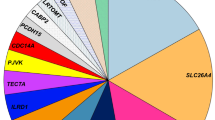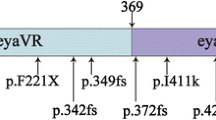Abstract
Usher syndrome is rare genetic disorder impairing two human senses, hearing and vision, with the characteristic late onset of vision loss. This syndrome is divided into three types. In all cases, the vision loss is postlingual, while loss of hearing is usually prelingual. The vestibular functions may also be disturbed in Usher type 1 and sometimes in type 3. Vestibular areflexia is helpful in making a proper diagnosis of the syndrome, but, often, the syndrome is misdiagnosed as a nonsyndromic hearing loss. Here, we present a Polish family with hearing loss, which was clinically classified as nonsyndromic. After excluding mutations in the DFNB1 locus, we implemented the next-generation sequencing method and revealed that hearing loss was syndromic and mutations in the USH2A gene indicate Usher syndrome. This research highlights the importance of molecular analysis in establishing a clinical diagnosis of congenital hearing loss.

Similar content being viewed by others
References
Behar DM, Davidov B, Brownstein Z, Ben-Yosef T, Avraham KB, Shohat M (2014) The many faces of sensorineural hearing loss: one founder and two novel mutations affecting one family of mixed Jewish ancestry. Genet Test Mol Biomarkers 18(2):123–126. https://doi.org/10.1089/gtmb.2013.0328
Beheshtian M, Babanejad M, Azaiez H, Bazazzadegan N, Kolbe D, Sloan-Heggen C, Arzhangi S, Booth K, Mohseni M, Frees K, Azizi MH, Daneshi A, Farhadi F, Kahrizi K, Smith RJH, Najmabadi H (2016) Heterogeneity of hereditary hearing loss in Iran: a comprehensive review. Arch Iran Med 19(10):720–728
Boughman JA, Vernon M, Shaver KA (1983) Usher syndrome: definition and estimate of prevalence from two high-risk populations. J Chronic Dis 36(8):595–603
de Brouwer APM, Pennings RJE, Roeters M, van Hauwe P, Astuto LM, Hoefsloot LH, Huygen PL, van den Helm B, Deutman AF, Bork JM, Kimberling WJ, Cremers FP, Cremers CW, Kremer H (2003) Mutations in the calcium-binding motifs of CDH23 and the 35delG mutation in GJB2 cause hearing loss in one family. Hum Genet 112(2):156–163. https://doi.org/10.1007/s00439-002-0833-0
Hope CI, Bundey S, Proops D, Fielder AR (1997) Usher syndrome in the city of Birmingham—prevalence and clinical classification. Br J Ophthalmol 81(1):46–53
Kimberling WJ, Hildebrand MS, Shearer AE, Jensen ML, Halder JA, Trzupek K, Cohn ES, Weleber RG, Stone EM, Smith RJ (2010) Frequency of Usher syndrome in two pediatric populations: implications for genetic screening of deaf and hard of hearing children. Genet Med 12(8):512–516. https://doi.org/10.1097/GIM.0b013e3181e5afb8
Kochhar A, Hildebrand MS, Smith RJ (2007) Clinical aspects of hereditary hearing loss. Genet Med 9(7):393–408. https://doi.org/10.1097/GIM.0b013e3180980bd0
Minami SB, Masuda S, Usui S, Mutai H, Matsunaga T (2012) Comorbidity of GJB2 and WFS1 mutations in one family. Gene 501(2):193–197. https://doi.org/10.1016/j.gene.2012.03.060
Ouyang XM, Yam D, Hejtmancik JF, Jacobson SG, Li AR, Du LL, Angeli S, Kaiser M, Balkany T, Liu XZ (2004) Mutational spectrum in Usher syndrome type II [Published erratum appears in Clin Genet. 2004 May;65(5):433]. Clin Genet 65(4):288–293. https://doi.org/10.1046/j.1399-0004.2004.00216.x
Qing J, Yan D, Zhou Y, Liu Q, Wu W, Xiao Z, Liu Y, Liu J, Du L, Xie D, Liu XZ (2014) Whole-exome sequencing to decipher the genetic heterogeneity of hearing loss in a Chinese family with deaf by deaf mating. PLoS One 9(10):e109178. https://doi.org/10.1371/journal.pone.0109178
Reiners J, Nagel-Wolfrum K, Jürgens J, Märker T, Wolfrum U (2006) Molecular basis of human Usher syndrome: deciphering the meshes of the Usher protein network provides insights into the pathomechanisms of the Usher disease. Exp Eye Res 83(1):97–119. https://doi.org/10.1016/j.exer.2005.11.010
Rosenberg T, Haim M, Hauch AM, Parving A (1997) The prevalence of Usher syndrome and other retinal dystrophy-hearing impairment associations. Clin Genet 51(5):314–321
Sadeghi AM, Kimberling WJ, Tranebjœrg L, Möller C (2004) The prevalence of Usher Syndrome in Sweden: a nationwide epidemiological and clinical survey. Audiol Med 2:220–228. https://doi.org/10.1080/16513860410003093
Sadeghi AM, Eriksson K, Kimberling WJ, Sjöström A, Möller C (2006) Longterm visual prognosis in Usher syndrome types 1 and 2. Acta Ophtalmol Scand 84(4):537–544. https://doi.org/10.1111/j.1600-0420.2006.00675.x
Snoeckx RL, Huygen PL, Feldmann D et al (2005) GJB2 mutations and degree of hearing loss: a multicenter study. Am J Hum Genet 77(6):945–957. https://doi.org/10.1086/497996
Spandau UH, Rohrschneider K (2002) Prevalence and geographical distribution of Usher syndrome in Germany. Graefes Arch Clin Exp Ophthalmol 240(6):495–498. https://doi.org/10.1007/s00417-002-0485-8
Vernon M (1969) Usher’s syndrome—deafness and progressive blindness. Clinical cases, prevention, theory and literature survey. J Chronic Dis 22:133–151
Wang HY, Zhao YL, Liu Q, Yuan H, Gao Y, Lan L, Yu L, Wang DY, Guan J, Wang QJ (2015) Identification of two disease-causing genes TJP2 and GJB2 in a Chinese family with unconditional autosomal dominant nonsyndromic hereditary hearing impairment. Chin Med J (Engl) 128(24):3345–3351
Acknowledgements
The study was supported by grant no. 2014/13/N/NZ5/03671 funded by the National Science Center, Królewska 57 Street, 30-081 Kraków, Poland, and grant no. 510-18-07 funded by the Mother and Child Institute, Kasprzaka 17a Street, 01-211 Warsaw, Poland.
Author information
Authors and Affiliations
Contributions
Katarzyna Niepokój: conception, first draft, revising and final approval, responsibility for all aspects of the work and the final manuscript version, data analysis, corresponding author.
Agnieszka M. Rygiel: manuscript revision, text structuralizing, final approval, responsibility for the final version of the manuscript.
Piotr Jurczak: manuscript revision, final approval, responsibility for the final version of the manuscript, especially good clinical description of the patients.
Aleksandra Kujko: laboratory test performance, responsibility for revision and final version approval.
Dominika Śniegórska: laboratory test performance, DNA isolation, responsibility for revision and the final version of the manuscript.
Justyna Sawicka: laboratory test performance, responsibility for revision and the final version of the manuscript, figure preparation.
Alicja Grabarczyk: laboratory test performance, responsibility for revision and the final version approval, especially references to manuscript table.
Jerzy Bal: critical revision for important intellectual content, final approval and responsibility for the manuscript content.
Katarzyna Wertheim-Tysarowska: manuscript revision on all writing stages of manuscript, final revision and approval.
Every author listed in the manuscript has seen and approved the submission of this version of the manuscript and takes full responsibility for the manuscript.
Corresponding author
Ethics declarations
Financial sources
1. Grant funded by the National Science Center, Poland (no. 2014/13/N/NZ5/03671 [KN]), title: Molecular basis of isolated hearing loss in a group of Polish patients- using of Next Generation Sequencing to identify genes and mutations responsible for the hereditary form of the disease.
The funds were spent on research and on a fee for the grant manager and one assistant. Fee payment was not related to any commitments resulting in a potential or real conflict of interest related to the published manuscript.
2. Grant funded by the Mother and Child Institute (no. 510-18-07[KN]), title: Molecular basis of Usher syndrome- a comprehensive analysis of 10 genes in a group of Polish patients using Next Generation Sequencing (NGS).
The funds were spent on research only and were not related to any commitments resulting in a potential or real conflict of interest related to the published manuscript.
None of the funding institutions participated or influenced the collection and analysis of data.
We don’t have any patents, whether planned, pending or issued, broadly relevant to the work.
We have no conflicts of interest to disclose.
There are no other relationships/conditions/circumstances that present a potential conflict of interest connected with financial ties, academic commitments, personal relationships, political or religious beliefs and institutional affiliations.
Ethical approval
The study was approved by the Ethics Committee of the Mother and Child Institute and was carried out in accordance with The Code of Ethics of the World Medical Association (Declaration of Helsinki).
All procedures performed in studies involving human participants were in accordance with the ethical standards of the institutional and/or national research committee and with the 1964 Helsinki declaration and its later amendments or comparable ethical standards.
Informed consent was obtained from all individual participants included in the study.
Additional information
Communicated by: Michal Witt
Rights and permissions
About this article
Cite this article
Niepokój, K., Rygiel, A.M., Jurczak, P. et al. Hearing impairment caused by mutations in two different genes responsible for nonsyndromic and syndromic hearing loss within a single family. J Appl Genetics 59, 67–72 (2018). https://doi.org/10.1007/s13353-017-0416-3
Received:
Revised:
Accepted:
Published:
Issue Date:
DOI: https://doi.org/10.1007/s13353-017-0416-3




